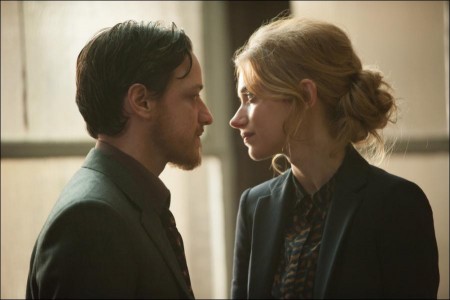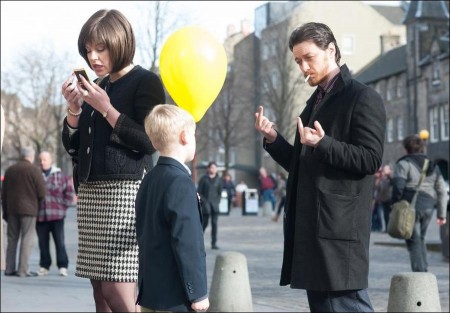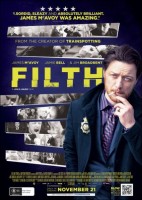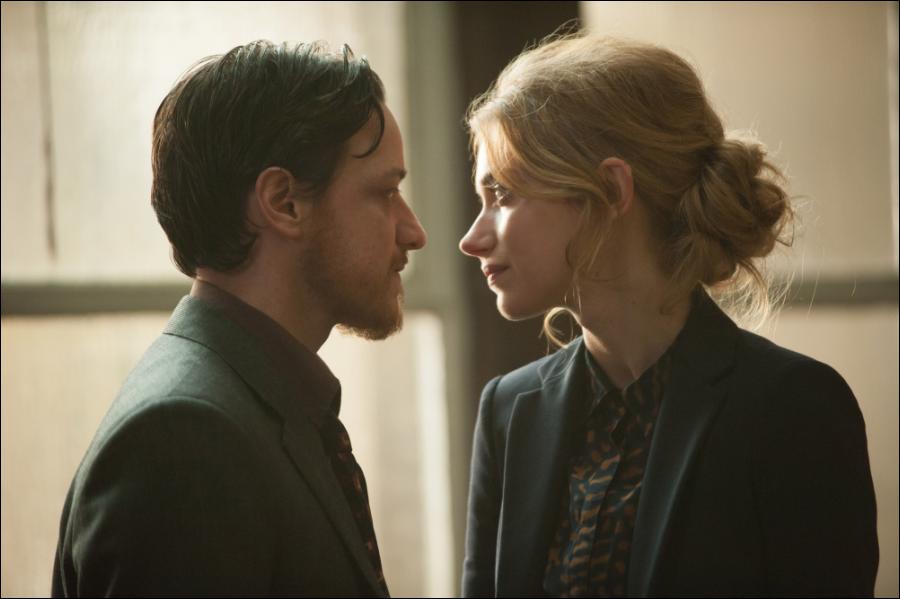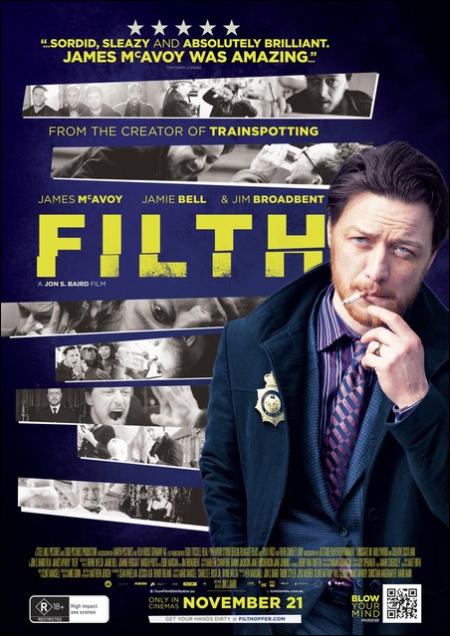Filth is a Scottish crime comedy-drama film written and directed by Jon S. Baird, based on Irvine Welsh’s novel Filth. The movie was released on 27 September 2013 in Scotland and on 4 October 2013 elsewhere in Britain and Ireland. The film was released in the United States on 30 May 2014.
Detective Sergeant Bruce Robertson wants a promotion. He is clearly the best man for the job – the rest of his colleagues are just idiots. Annoyingly, there’s been a murder and Bruce’s boss wants results. No problem for Bruce. He’s in control and when he solves the case and wins the promotion, his wife will return to him. No problem. But is life that simple? Is Bruce the man he really thinks he is? The tragic, hilarious and memorable answers unfold in Filth…
Director’s Statement
Getting Inside Bruce’s Head
I’ll never forget the moment I found him – 10am, Tuesday January 15th, 2011. I was waiting in the lobby of a Soho hotel feeling somewhat apprehensive, because casting the perfect Bruce Robertson was proving the hardest task of all. Not that it came as any great surprise. Comedy, tragedy, violence, sex and insanity: the part demanded it all, and demanded it all in extremes. There was no hiding place for whoever landed this potentially career-defining role. Bruce was in every scene. He was FILTH.
I’d naively assumed that James McAvoy probably had a gentle kind of upbringing, but ten minutes into our meeting, as he started to explain his tough Glaswegian background, and why exactly he understood this character, a shiver raced up my spine. McAvoy’s intelligence, humor and edge immediately put him in a league of his own, and the hunt for Bruce Robertson had come to an end.
The journey had started when I first met Irvine Welsh at the launch of Crime: his unofficial sequel to FILTH. In truth, FILTH had always been my favorite of Irvine’s novels and something I regarded as a modern masterpiece, so it was a great relief when he seemed receptive to my ‘elevator style pitch’, and encouraged that it was going to be very different from other earlier attempts at an adaptation. However, even with a genuine love for the material, and an original vision (in theory at least), bringing FILTH to life was going to be a serious challenge.
Bruce was obviously this incredibly magnetic character, but because of the nature of his remarkably repugnant actions, I felt that even the most liberal of filmgoers would find it difficult to empathize with him. I therefore decided that to be faithful to the novel, Bruce certainly required the menace of a Malcolm McDowell in A Clockwork Orange, but if he was to be accepted by a wider cinema audience, he also definitely required the charm and vulnerability of a Jack Nicholson in One Flew Over The Cuckoo’s Nest.
Moreover, it was extremely important that the audience understood exactly why this larger-than-life character was unraveling in front of their eyes. It’s not apparent in the novel if Bruce actually has a mental illness, but I’d always attributed his manic behavior to bi-polar disorder.
In the novel, Dr. Rossi, Bruce’s GP, only deals with his physical ailments, but I thought it more interesting if we changed Rossi to a psychiatrist, and therefore gave Bruce psychological rather than physical problems. In addition, as Bruce’s state of mind deteriorated, Rossi could then personify the tapeworm growing inside Bruce – the main tool of exposition from the novel.
The most nerve-wracking part of making the whole film was showing Irvine the first draft of the script. Even with his apparent positivity towards my vision, I wasn’t entirely sure how protective he might be over any specific characters or storylines (some of which I obviously had to lose or amalgamate to help tighten the narrative), but thankfully he was genuinely thrilled, which in turn gave me great confidence to go ahead and make FILTH in the way I’d always envisaged.
For me the film is quite simply a story about love and loss, but played out in a theatre of heightened reality and surrealism. When the sex, drugs, violence and hilarity have been stripped away, FILTH at its core is the tragic tale of a desperate man trying to win back his family, while attempting to cope with a deep-rooted psychological condition.
Beginnings: ‘The Same Rules Apply’
Filmmaker Jon S. Baird felt a very personal connection to the world of FILTH from the moment he picked up the book. Irvine Welsh’s much-loved novel recounts the story of not only one of the most iconic, foul-mouthed, irate and downright hilarious policemen in modern fiction, but also one of the most tragic.
Behind the enormous, expletive-riddled persona presented by Detective Sergeant Bruce Robertson, lies a man plagued with issues that stem from a deteriorating mental and physical heath.
For writer-director Baird, who made his name with his acclaimed directorial debut Cass, it was the decline in Bruce’s mental wellbeing that resonated most of all. “I scripted Bruce in a particular way because I grew up with someone who had bipolar disorder” Baird explains. “Bruce’s psychological condition is one of the main reasons I had such a genuine connection to the material.” The filmmaker’s knowledge and understanding of mental illness ensured that he was careful not to stigmatize it in any way. “It was important to explain why Bruce is the way he is, rather than just presenting him as this really nasty person. I felt it was vital for the audience to understand that. Bruce couldn’t just be this one-dimensional bad guy. What would be the point?”
As with the majority of readers of Welsh’s novel, Baird was also struck by the book’s outrageous humor. Bruce Robertson is as mean as hell but hilarious to boot, a wisecracking, fizzing, sparking generator of violent invective — God help those who suffer a personal taste of his unsavory words and deeds.
“The most interesting thing for me, apart from Bruce’s mental state, was the outrageous darkly comedic moments in the book” continues Baird, “I wanted the film version of FILTH to bring the comedy front and center, because underneath everything Bruce is very, very funny.”
Of all his novels, says Welsh, it was FILTH that he, “would most like to see adapted into a movie.” Welsh maintains that it was a difficult book to write and the adaptation process, too, has proved far from easy. When coming together with Baird and his producing partner Ken Marshall — who has enjoyed success with the likes of London to Brighton, The Cottage and the recent Song for Marion — the novelist finally found two filmmakers that he thought could do justice to his work.
Baird had read FILTH upon its publication, “and I thought it was one of the most unique, and impressive pieces of work I had ever encountered,” he says. “It always stayed with me and I went back to it several times in the decade between buying the novel and first meeting Irvine.”
The filmmaker met Welsh at the June 2008 launch of the unofficial sequel to FILTH, Crime, which follows Ray Lennox, one of the supporting characters from FILTH (played by Jamie Bell), after he becomes a Detective Inspector. “Irvine, was a real hero of mine and I remember being nervous about meeting him. I think the first thing I unsubtly blurted out was that I thought Filth was his best book, then immediately asked whether the option was available!”
The film rights had resided with another production company, though reverted to Welsh, “and when Irvine and I spoke again in August 2008, the book option had become available,” the writer-director adds. Baird and producer Ken Marshall then travelled to Welsh’s home to finalize the deal.
“We arranged to go to Dublin for the day,” begins Marshall. “Irvine was living there at the time and Jon and I decided to go and sell ourselves and show how much we wanted to bring this novel to the big screen.”
“Irv, Jon and I had a great lunch,” he adds, “and went on this pub crawl around all these parts Irv frequented and I vaguely remember Jon and I getting on the last flight that evening! I think that trip just might have sealed it.”
The pair had hit it off with Welsh straightaway. “I think he knew that we were serious,” Marshall continues, “that we were relatively young and hungry and very keen to do the book justice. It is Jon’s favorite novel and on the back of that trip we optioned the book.”
Once the book was optioned the producer-director team had a very clear vision for their adaptation, which Baird would bring to life with the screenplay. “I think previous attempts at an adaptation had tried to do it as a quite literal translation, in terms of it being really dark and gritty, more like a thriller and more of a social realism approach” says Baird. “But, while the story is a tragedy and has an extremely tragic central character, I thought the book’s black humor was the key to unlocking a more cinematic adaptation.”
Marshall agrees: “We set out to create this dark comedy which was going to be incredibly unique and bold and unlike anything out there (in the marketplace). That was the challenge — to create an adaptation of this novel and to do it justice, to make sure that we were as faithful to the book as possible while making it fully cinematic.”
FILTH might be a story that explores mental illness, grief and loss, “but we needed to make sure that the film was going to be funny and cinematic and bold and commercial. That was the challenge,” says the producer. “Luckily, we ended up with a script that did just that. Jon did an amazing job with the adaptation. Irvine was over the moon.”
Baird’s script aims to be as faithful as possible to Welsh’s original material, “although we obviously had to make some changes. It’s the nature of the beast when dealing with existing material” recalls Baird, who remembers with slight discomfort the night he sent his first draft to Welsh.
“Irvine lives in Chicago so I emailed it to him just before I went to bed, knowing he would read it as I slept,” the filmmaker adds. “Irvine hadn’t read a single word of the screenplay up to that point, so I was quite nervous about what his reaction might be.”
“I turned off my BlackBerry, which is unusual for me as I always keep it on next to my bedside, but still didn’t sleep a wink. But fortunately when I turned it back on in the morning I had this amazing email from Irvine waiting for me, saying how it had exceeded all his expectations and how proud of it he was. His exact words were, ‘Don’t change a word, you’ve really captured Bruce.’”
In his bid to focus on Bruce’s story, Baird amalgamated a few of the minor characters into the person of Dougie Gillman, one of Bruce’s co-workers, and concentrated much of the plotting around Bruce’s bid to earn promotion, which Bruce hopes will win his estranged wife’s return, rather than the murder case that plays more of a prominent part in the book.
“When tackling an adaptation you have to put the original material ‘through a sieve’ so to speak. After looking at every chapter in minute detail, I felt that the murder case wasn’t the most interesting thing about the novel. It’s certainly not the most important thing about the film,” explains Baird. “Irvine’s work is more about characters and that’s what always attracts me to a project.”
“Bruce’s motivation, but moreover his desperation, is to get his wife back, and he genuinely believes he will do that by winning the race for the Detective Inspector position. That was what I identified would be the main through line for the movie. The scramble for promotion therefore became the key narrative thread which was driving all of Bruce actions.”
“Before I wrote a single word of the screenplay, I noted down every section of the novel onto place cards, then pinned them all against the wall of my office. I always find that really helps when adapting something as you can stand back and quite literally get a complete overview of the entire original material.”
Welsh’s novel also contains some very brutal language. “Ultimately,” Baird says, “we pared a little bit of the language back, but we didn’t compromise and were very careful to leave the iconic ‘Bruce-isms’ in there: ‘I kid you not’ and ‘The same rules apply’ are Bruce’s trademarks, and what a lot of Irvine’s fans associate with the character of Bruce Robertson.
Picking up the Pieces: Detective Sergeant Bruce Robertson
The central character in FILTH is one of the most memorable in modern British fiction. Detective Sergeant Bruce Robertson introduces himself as an unashamed emotional hardnut and the master of most of what he surveys. He is smart and plugged in; other people are idiots and are to be treated as an inconvenience at best.
“There are so many different ways to describe Bruce,” says producer Ken Marshall. “The guy is a bastard — a homophobic, racist, misogynistic chauvinist!”
During the course of the story, Bruce bids to rise up the ladder and win what he perceives as a well-earned promotion. But Bruce has issues. He wants his wife and child back, too, and he feels compelled to put a lot of people around him in their rightful places.
“He is essentially a horrible man,” says Marshall, “but the key to the whole script and to the film was that we needed the audience to feel some empathy and sympathy for this guy.”
“If by the end of the film people don’t care about Bruce, then we are in trouble. That was the key. You don’t associate Bruce with a character that you are going to care about, but for us he is a tragic figure and somebody who regardless of how disturbed and demented and f—ked up he is, is dealing with universal issues of grief and loss.
“Ultimately, we wanted to create a comedy, albeit a dark one and a tragic one, and finding that balance is quite tricky.”
FILTH is a comedy, a drama and a tragedy although, “Bruce is a guilty pleasure,” Marshall notes. “He is someone that people enjoy seeing manipulate and take advantage of those around him. And that was a big challenge — finding the right actor to play Bruce.”
Baird agrees — “finding the most suitable Bruce Robertson was paramount”, he says. “FILTH is Bruce Robertson and everything hinged on his performance. If we’d not found the right actor, the film just wouldn’t have worked. It’s as simple as that.”
To cast the right Bruce Robertson the filmmakers turned to acclaimed Scottish actor James McAvoy, best known for the likes of The Last King of Scotland, Atonement, Wanted, X-Men: First Class and Trance.
“I remember the day we met so well,” says Baird. “Irvine, Ken and I were waiting for him to arrive, and in walked James wearing a baseball cap, looking about 15 years old. Irvine and Ken left us together and as soon as we started talking about the character, James completely changed into this grizzled, middle aged cop.”
“He started telling me about his tough upbringing and life in Glasgow growing up with his grandparents. I originally thought James was a middle-class Scotsman but he’s definitely not. He’s far edgier than people might first imagine.”
McAvoy says that Baird’s script was the best he had read in years. “I could see my route through it as well,” begins the actor. “Sometimes when you read a script you don’t start getting ideas and that can be slightly worrying.
“I have done jobs where I think, ‘I don’t know what the f—k I am going to do,’ and you just get there on the day and you make it work. But with FILTH, every single scene just presented so many ideas and I was inspired immediately.”
Casting McAvoy, says Baird, not only provides the film with an excellent actor, but also someone with whom the audience has some history and some empathy, which is vital when telling a story about the outwardly despicable Bruce Robertson.
“Finding someone like James who the audience has history with, means they’ll find it easier to accept what he is doing on screen,” says the writer-director, “not only because he’s a brilliant actor, but also because he has form in another way.”
Marshall concurs: “James immediately made Bruce likeable. People will be going to the cinema who already love James as a person and as an actor, because he is a likeable person and he is not someone who does stupid things in the press and is chasing celebrity and all that nonsense.”
Filth
Directed by: Jon S. Baird
Stars: James McAvoy, Jamie Bell, Imogen Poots, Joanne Froggatt, Jim Broadbent, Shirley Henderson, Magnolia Pictures
Screenplay by: Jon S. Baird, Irvine Welsh
Production Design by: Mike Gunn
Cinematography by: Matthew Jensen
Film Editing by: Mark Eckersley
Costume Design by: Guy Speranza
Set Decoration by: Claire Pidgeon
Music by: Clint Mansell
Studio: Magnolia Pictures
Release Date: May 30, 2014
Visits: 101

